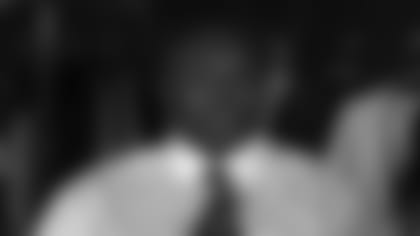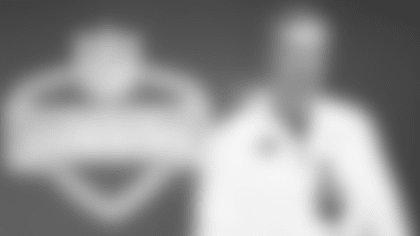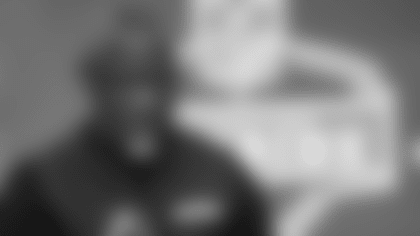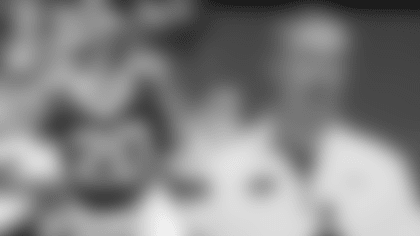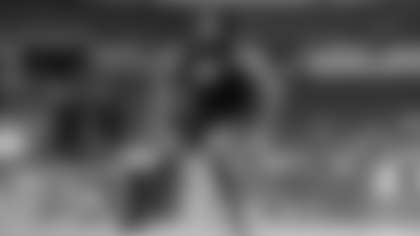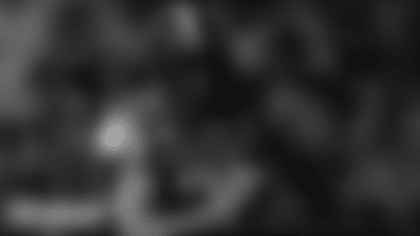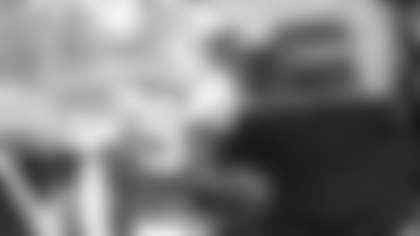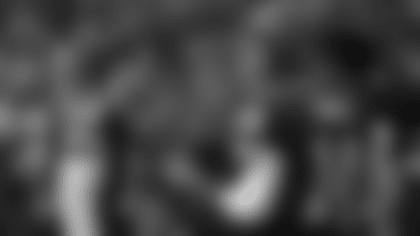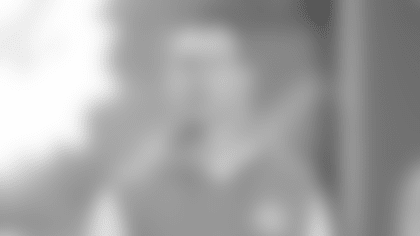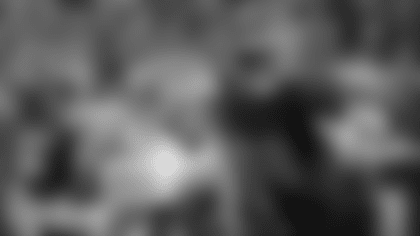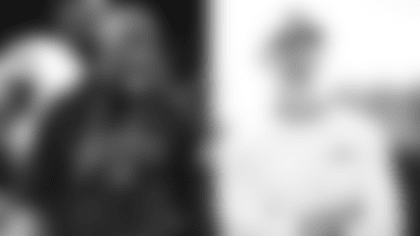I know what I want and I know how to get it!
That one sentence can explain a lot about the Jets' draft, and certainly about their actions on Day One of this year's selection meeting. While some are talking about the Jets burning picks in their Saturday trades to move up and select Pittsburgh CB Darrelle Revis and Michigan LB David Harris, we think the Jets did what they had to do, not only to get the players they wanted but to address the needs they felt were most pressing for their team.
After the acquisition of RB Thomas Jones earlier this year, the focus of this draft for the Jets was clearly going to be the defense. With their struggles to initiate a pass rush, they needed a top cover corner, and they got the player that most teams had rated as the top CB in this draft in Revis. They also needed an inside LB who was productive and could help DT Dewayne Robertson stuff the inside run. They got that in Harris.
We'll get into what these players bring to the table in a minute. But the real positive for Jets fans is that your front office was aggressive and went out and acquired two of the top defensive players available in this draft and, in "burning" those picks, showed they were after quality more than quantity. They acted like an organization that feels it is close to putting a very good team on the field, and that should make everyone who follows the Jets feel good about this weekend.
Defensive Upgrades
The selection of Revis is guaranteed to improve the weakest link in the Jets defense. He is big and fast, and he is a playmaker of the highest degree. There were no Champ Bailey-type cover corners in this draft, but in Revis the Jets got the closest thing to it, and he is a player with a tremendous amount of upside.
For those looking for comparisons, he has Al Harris qualities in terms of his coverage ability, but could be Bailey in terms of his physical skills. Revis ran his short shuttle in 4.0 this winter, which measures his quickness, and his three-cone time, a good measure of his change-of-direction skills, was an unbelievable 6.56. He will have the ability to turn and run with receivers downfield and has the ability to mirror WRs, change directions and stay with them step for step in and out of their cuts. He's a very good player who gives the Jets the ability to play more man coverage and will make an impact right away.
With Harris in the fold, the Jets will now be able to put Jonathan Vilma back where he belongs in this defense, on the weakside in their 40 fronts, and as the weak inside 'backer in their 3-4 alignments.
The question the Jets had to answer heading into this off-season was how to remain flexible on defense, give themselves the option to scheme against their opponents week to week, and still protect Vilma, who is probably the most talented player on their defense when he is able to do what he does best, which is run to the ball and make plays.
Harris, who had 196 tackles, 19 TFLs and 3 sacks in 25 starts at Michigan, gives them a chance to do that. He is a physically strong player who can hold his own at the point of attack and has played in the 3-4 at Michigan. He can take on blockers and does a good job with his size, strength and hands of shedding and getting to the ball. That will keep blockers off Vilma and allow him to run.
Robertson has struggled in the 3-4 at times due in large part to his lack of height and his inability to see past the blockers in front of him. Harris is a thumper in the middle and will be able to take on the guard himself, freeing up Robertson. He's a more athletic and faster Ted Johnson, who helped anchor the middle of the Patriots' defenses during their early Super Bowl runs.
And in case you were wondering, both are great kids, high-character guys who love football and have shown a great work ethic to this point. Eric Mangini has really been hanging on the character issue, and that was a big factor in all their picks this weekend.
Day Two Projects
With only two picks on the second day, the Jets went after players who fit their mold of tough, smart, competitive, high-character guys. Jacob Bender, a Nicholls State product, is a big, strong prospect at 6'6" and 315 pounds. As they say in the NFL, you can't teach size, so the Jets will look to develop him over time. Though he was very productive against a lower level of competition, he is a name to remember for the future.
Clemson WR Chansi Stuckey was also very productive in college, making 141 catches for the Tigers in his career. He fell in this draft due in large part to a foot problem that had some teams questioning his durability. But despite the flag, he was obviously able to play with the injury, and if the Jets can keep him on the field, they feel he has a chance to be a good receiver out of the slot at the NFL level.
Teams Who Helped Themselves
1. Cleveland –The Browns' first round speaks for itself. Though they gave up next year's first-round choice to get back into the first round to get Brady Quinn, the former Golden Domer will start this year, giving the team a jump on its reclamation project. OT Joe Thomas is another immediate starter and his addition to a line that already had Eric Steinbach has to have Romeo Crennel feeling good about the offense.
In the third round, the Browns picked up UNLV CB Eric Wright, a Southern Cal transfer with some major character issues. But that aside, most scouts felt Wright was the top CB in the draft based solely on his onfield performance. Cleveland has been terrible in the secondary and Wright can be a starter as a rookie if he can walk the straight and narrow. Word is that Wright is free of his demons, but until he proves he can be a good citizen, the jury will remain out.
Melila Purcell of Hawaii and Chase Pittman of LSU are both productive DEs who can play in the 3-4 defense. The Browns will keep six D-linemen on their gameday roster and need players who can stay in the game. They both fit the bill, and scouts compare Pittman to Jet and former Patriot Bobby Hamilton.
2. San Francisco –You have to wonder why the Seahawks would trade a player like Darrell Jackson to a team in their own division. The reason is that Jackson is still recovering from injury and can't play right now. The 49ers probably gave away too much for a player who has struggled to stay on the field. Other than that, the Niners did very well this past weekend.
Patrick Willis was by far the best LB in the draft. Two coaches told us they had Joe Staley as the top O-linemen on their boards. WR Jason Hill was slow at the combine but ran a 4.4 at his Pro Day. He has maybe the softest hands in this draft class and runs excellent routes. Third-rounder Ray McDonald can play all three spots along the line in San Fran's 3-4 scheme, and Day Two picks Jay Moore and Joe Cohen both add depth to the defense.
The Niners have gotten big on D, a problem that has plagued their front seven in recent seasons. CB Tarell Brown has character issues but, taken as late as he was, he's not a huge risk and has the skills to start if they can keep him on track. The bottom line is that the team's top four picks could account for 45 starts this coming season. The young players will play, and it is evident that coaching the Senior Bowl the last two years has been a huge benefit for Mike Nolan and his staff.
3. Carolina – First-rounder Jon Beason can play the Mike if Dan Morgan can't go, or else he'll be the Will 'backer. He has played all three positions in a similar defense in college and has enough of a mental grasp of the game to call the defense. The trade with the Jets gave them Ryan Kalil, far and away the best center in the draft. WR Dwayne Jarrett, though some question his speed, has been an unbelievably productive player to this point, and to get him in the second round was a steal.
Georgia DE Charles Johnson is good player, and if John Fox can light a fire under him, he can make an impact. Penn State LB Tim Shaw is better than the 164th pick in this draft. He played as a pass rush end at PSU due to team need, and it is well known around the Nittany Lions program that Shaw beat Levi Brown in practice every single day. He can be a pass rush LB and will make a huge impact right away on special teams.
Some That We Question
1. Denver – Jarvis Moss is weak and undersized and was in trouble at Florida more than once. We question whether he can be an impact player in the NFL, and we certainly don't think he was a first-round value. To trade up for him in Round 1 was a reach. He won't be the answer to Denver's pass rushing woes.
2. Miami – Dolphins fans will now have to forever live with the sin of taking Ted Ginn over Brady Quinn. Ginn can't run routes and lacks any kind of polish as a receiver. He's a go-route guy and teams will know that when they see him coming. Yes, he can have an impact in the return game, and for those who point to Devin Hester's success, here's a news flash: Hester wasn't taken with the ninth pick in the draft. QB John Beck is already 26 years old. Lorenzo Booker is no more than a third-down back, and NT Paul Soliai is big but too slow to play in the 4-3.
3. New Orleans – WR Robert Meachem is going to be a great player, but the Saints certainly had more pressing needs. Third-round corner Usama Young is the highest-drafted player to not be invited to the combine. The rest of their draft consists of a bunch of projects.
Others: San Diego reached for both WR Craig Davis and S Eric Weddle. We like ILB Anthony Waters, but he has an injury history. ... Tennessee made a good pick in first-round S Michael Griffin, but second-round RB Chris Henry was never a starter in college and was a reach. Paul Williams is just an average receiver, C Leroy Harris has been falling all year, and DT Antonio Johnson has just five career starts at Mississippi State.
No Deal
A big story on draft weekend was the trades that were rumored but never consummated. Chicago LB Lance Briggs, San Diego RB Michael Turner, Kansas City QB Trent Green and others were thought to be on the table but never got announced as expected. Here's what happened:
San Diego was offered a first-rounder and turned it down. That tells us the Chargers never intended to trade him, which is something they will regret because they won't be able to re-sign him.
The Washington-Chicago deal for Briggs could still happen. Bears GM Jerry Angelo doesn't think he can get Briggs signed, so look for something to come down in the next few weeks.
The Dolphins offered a sixth-rounder for Trent Green. Kansas City didn't bite, and now with Miami passing on Brady Quinn, the Chiefs will get a fifth-rounder from the 'Fins for Green in the next couple weeks.
In all three situations there is now an "if" trade option in place. Because these deals will happen after this year's draft, the teams trading away these players can ask for 2008 draft picks and make the compensation dependent on performance, which could be a benefit to the Bears, Chargers and Chiefs because all three players could play well in 2007.
The Packers would not come off their offer of a sixth-round pick for Randy Moss. Raiders head coach Lane Kiffin says Moss can run a 4.3 40 right now, and if no trade was done, Moss was prepared to have a private workout for teams to prove it. Figuring his value would only jump if that happened, New England jumped in for a fourth-round pick. It's a fit for both sides because with Bill Belichick and Tom Brady in place, Moss can go and disappear. For the Pats, they are in complete control in terms of the contract that Moss will sign.


